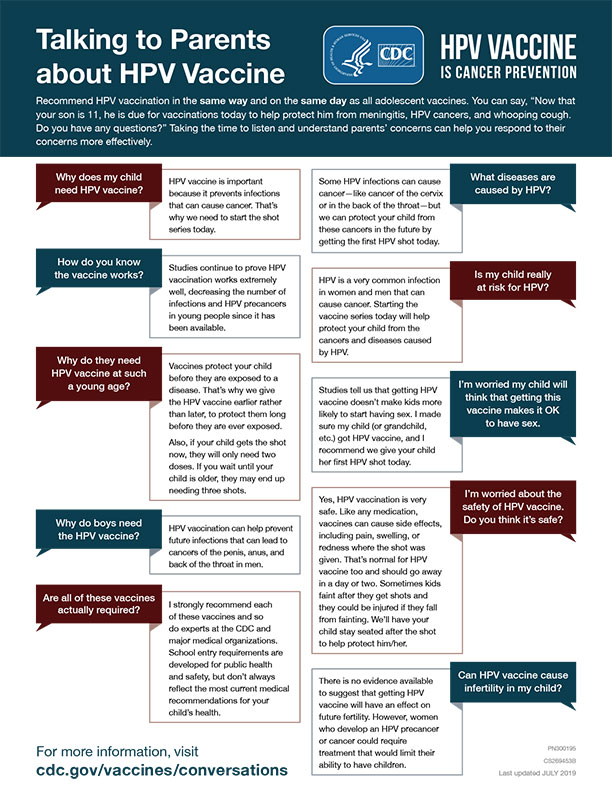HPV Vaccination Recommendations
For the full text of CDC’s Advisory Committee on Immunization Practices (ACIP) recommendations, see the Human Papillomavirus (HPV) ACIP Vaccine Recommendations.
Vaccination Recommendations
- HPV vaccine is recommended for routine vaccination at age 11 or 12 years. (Vaccination can be started at age 9.)
- ACIP also recommends vaccination for everyone through age 26 years if not adequately vaccinated when younger. HPV vaccination is given as a series of either two or three doses, depending on age at initial vaccination.
- Vaccination is not recommended for everyone older than age 26 years. Some adults ages 27 through 45 years might decide to get the HPV vaccine based on discussion with their clinician, if they did not get adequately vaccinated when they were younger. HPV vaccination of people in this age range provides less benefit, for several reasons, including that more people in this age range have already been exposed to HPV.
- For adults ages 27 through 45 years, clinicians can consider discussing HPV vaccination with people who are most likely to benefit. HPV vaccination does not need to be discussed with most adults over age 26 years. See ACIP’s shared clinical decision-making FAQs.
Keep in mind that HPV vaccination prevents new HPV infections but does not treat existing HPV infections or diseases. HPV vaccine works best when given before any exposure to HPV.
Most sexually active adults have already been exposed to HPV, although not necessarily all of the HPV types targeted by vaccination. At any age, having a new sex partner is a risk factor for getting a new HPV infection. People who are in a long-term, mutually monogamous relationship are not likely to get a new HPV infection.
Dosing Schedules
Two doses of HPV vaccine are recommended for most persons starting the series before their 15th birthday.
- The second dose of HPV vaccine should be given 6 to 12 months after the first dose.
- Adolescents who receive two doses less than 5 months apart will require a third dose of HPV vaccine.
Three doses of HPV vaccine are recommended for teens and young adults who start the series at ages 15 through 26 years, and for immunocompromised persons.
- The recommended three-dose schedule is 0, 1–2 and 6 months.
- Three doses are recommended for immunocompromised persons (including those with HIV infection) aged 9 through 26 years.
Contraindications and Precautions
A severe allergic reaction (e.g., anaphylaxis) to a vaccine component or following a prior dose of HPV vaccine is a contraindication to receipt of HPV vaccine.
- 9-valent HPV vaccine is produced in Saccharomyces cerevisiae (baker’s yeast) and is contraindicated for persons with a history of immediate hypersensitivity to yeast.
- A moderate or severe acute illness is a precaution to vaccination, and vaccination should be deferred until symptoms of the acute illness improve.
- A minor acute illness (e.g., diarrhea or mild upper respiratory tract infection, with or without fever) is not a reason to defer vaccination.
Pregnancy
HPV vaccine is not recommended for use during pregnancy. People known to be pregnant should delay initiation of the vaccination series until after the pregnancy. However, pregnancy testing before vaccination is not needed.
Although HPV vaccines have not been linked to causing adverse pregnancy outcomes or side effects (adverse events) to the developing fetus among pregnant people vaccinated inadvertently, HPV vaccines have not been studied in pregnant people in clinical trials.
- If a person is found to be pregnant after starting the HPV vaccine series, second and/or third doses should be delayed until they are no longer pregnant.
- If a person receives HPV vaccine and later learns that they are pregnant, there is no reason to be alarmed.
- Anyone who learns they are pregnant when they received an HPV vaccine can contact the manufacturer at 1-877-888-4231.
- Any suspected adverse events following HPV vaccination during pregnancy should be reported to VAERS.
Vaccine Safety
HPV vaccines are very safe. Scientific research shows the benefits of HPV vaccination far outweigh the potential risks. Like all medical interventions, vaccines can have some side effects.
All vaccines used in the United States, including HPV vaccines, go through extensive safety testing before the U.S. Food and Drug Administration (FDA) licenses them. During clinical trials before the licensure, the 9-valent HPV vaccine Gardasil 9 was studied in more than 15,000 males and females and was found to be safe and effective.
- For more information about HPV vaccine safety, visit HPV Vaccine Safety and Effectiveness Data | CDC.
Adverse Reactions
- The most common adverse reactions reported during clinical trials of HPV vaccines were local reactions at the site of injection.
- In prelicensure clinical trials, local reactions such as pain, redness, or swelling were reported by 20% to 90% of recipients.
- A temperature of 100°F during the 15 days after vaccination was reported in 10% to 13% of HPV vaccine recipients. A similar proportion of placebo recipients reported an elevated temperature.
- A variety of systemic adverse reactions have been reported by vaccine recipients, including nausea, dizziness, myalgia, and malaise. However, these symptoms occurred with equal frequency among both HPV vaccine and placebo recipients.
- Local reactions generally increased in frequency with increasing doses. However, reports of fever did not increase significantly with increasing doses.
- No serious adverse events have been associated with any HPV vaccine. Ongoing monitoring is conducted by CDC and the Food and Drug Administration.
Syncope (fainting) can occur after any medical procedure, including vaccination. Adolescents should be seated or lying down during vaccination and remain in that position for 15 minutes after vaccination. This is to prevent any injuries that could occur from a fall during a syncopal event.
